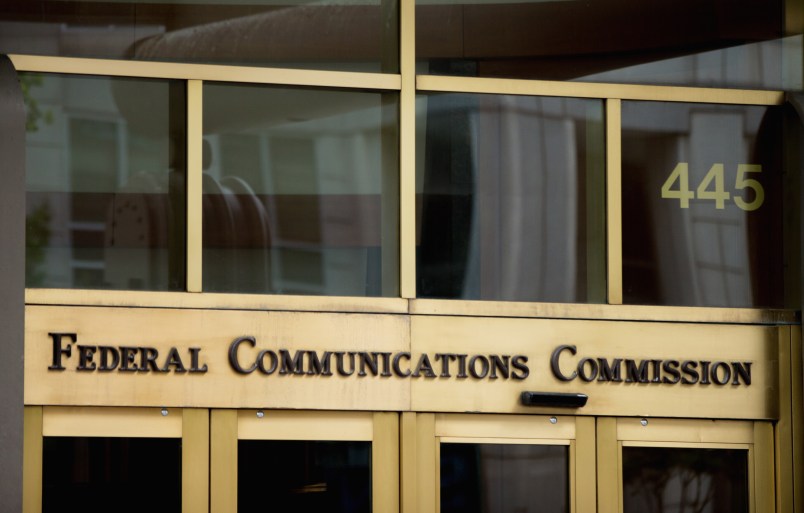NEW YORK (AP) — Federal regulators have weakened rules meant to support independent local media.
Now, one company can own newspapers and broadcast stations in one market, undoing a ban in place since 1975. Thursday’s decision by the Federal Communications Commission also makes it easier for one company to own two broadcast TV stations in one market and coordinate operations with stations owned by others.
Although the changes won’t affect AT&T’s pending bid for Time Warner and its cable channels, they come as cable and phone companies have grown into industry giants through acquisitions. The newspaper and broadcasting industries say they need the changes to deal with growing competition from the web and cable companies.
The Republican-dominated FCC approved the changes in a 3-2 vote along party lines. The two Democratic commissioners and other critics say that dumping these rules, by encouraging consolidation, hurts media diversity. Free Press, a group that opposes media mergers, said Thursday that it will challenge the rule changes in court.
“This act will pave the way for massive broadcast conglomerates to increasingly provide local viewers with nationalized cookie-cutter news and corporate propaganda that’s produced elsewhere,” said Sen. Bill Nelson, a Florida Democrat.
The FCC previously granted exceptions for companies such as News Corp. to own both a newspaper and a radio or TV station in the same market. Scrapping the rule would let more companies do so without needing to make the case for an exception.
The FCC is also loosening restrictions on one company owning two TV stations in the same market. TV station owner Sinclair is expected to benefit from these changes. It has a pending deal for rival Tribune Media that regulators still must clear. They both own TV stations that air local news and programming from the major networks, ABC, CBS, NBC and Fox, around the country.
The Sinclair deal has drawn criticism from an unusual coalition: consumer advocacy groups that generally oppose media consolidation, conservative media companies that are rivals to the right-leaning Sinclair and cable and satellite TV companies that worry that a beefed-up Sinclair will be able to get even higher fees from them.
The rule changes, however, would not apply to AT&T and Time Warner because the FCC is not reviewing that and neither company owns a TV or radio station or a local paper. The Justice Department is still reviewing that $85 billion deal. Its widely expected approval has run into hurdles.
The FCC has already taken steps favorable to broadcasters and Sinclair. It scrapped a rule that required TV and radio broadcasters to maintain a local studio and withdrew a technical measure that hindered media consolidation. Sinclair would reach 72 percent of American households if the Tribune Media deal goes through.
The FCC also voted Thursday to allow a new broadcasting standard known as “next-gen TV,” which Sinclair and the broadcasting lobby has pushed for. It will allow for better-quality video and improved reception, let broadcasters beam TV programming directly to phones and, they hope, make money from advertising targeted to consumers based on data about them, like Facebook and Google do.
The two Democratic commissioners dissented, saying the agency’s approach will mean higher costs for consumers if they have to buy new TV sets to get the signals, just as they had to buy digital TVs or converters when analog transmissions ceased in the past decade. The government offered $40 coupons for converter boxes to help defray costs during that transition. According to the Democrats, there are no provisions for similar subsidies this time.
The agency also voted Thursday on party lines to pursue new limits on Lifeline, a program that makes internet service cheaper for the poor and serves about 12 million people. The FCC also made it easier for phone companies like AT&T and Verizon to ditch their old copper networks as they upgrade to newer technologies. Democrats say these measures will make it more difficult for poor people to go online and harm rural customers who depend on their landlines.
In a largely non-controversial move, the agency also made clear that carriers can block calls coming from obvious spammers who are faking what number shows up for consumers on their caller IDs.







And so the fascist Sinclair Broadcast Group takeover begins.
Sinclair salivates. @tiowally beat me to it.
They’re absolutely creaming their shorts.
This is going to be many orders of magnitude worse than ending the Fairness Doctrine ever dreamed of being.
More power to the fascist media trust . . . ugh!
(How many people watch broadcast TV any more? I know it’s a lot, and concentrated among the most vulnerable to propaganda, but still.)
Allowing the ownership of multiple stations in the same market is particularly pernicious because it lets someone like Sinclair do good cop/bad cop and gaslighting in addition to the usual lies.